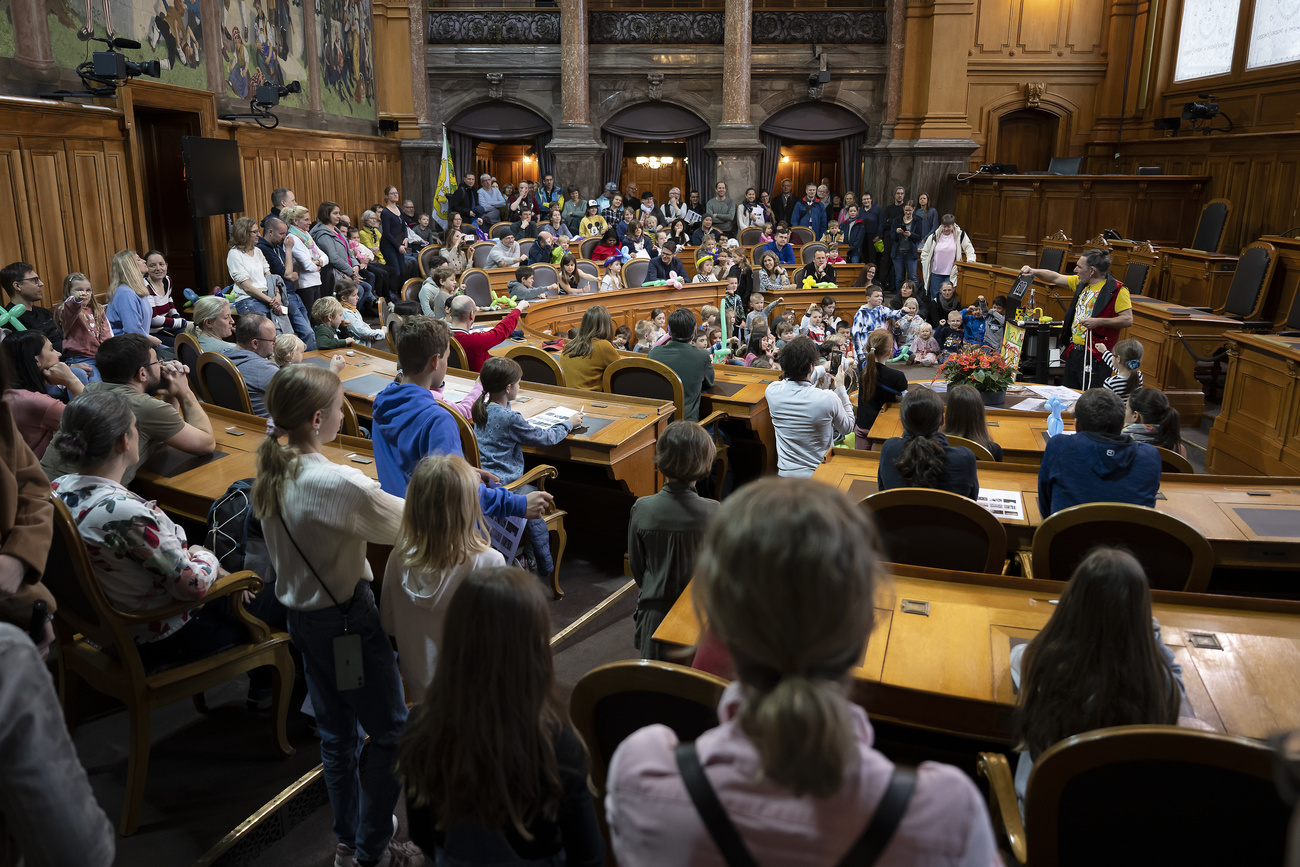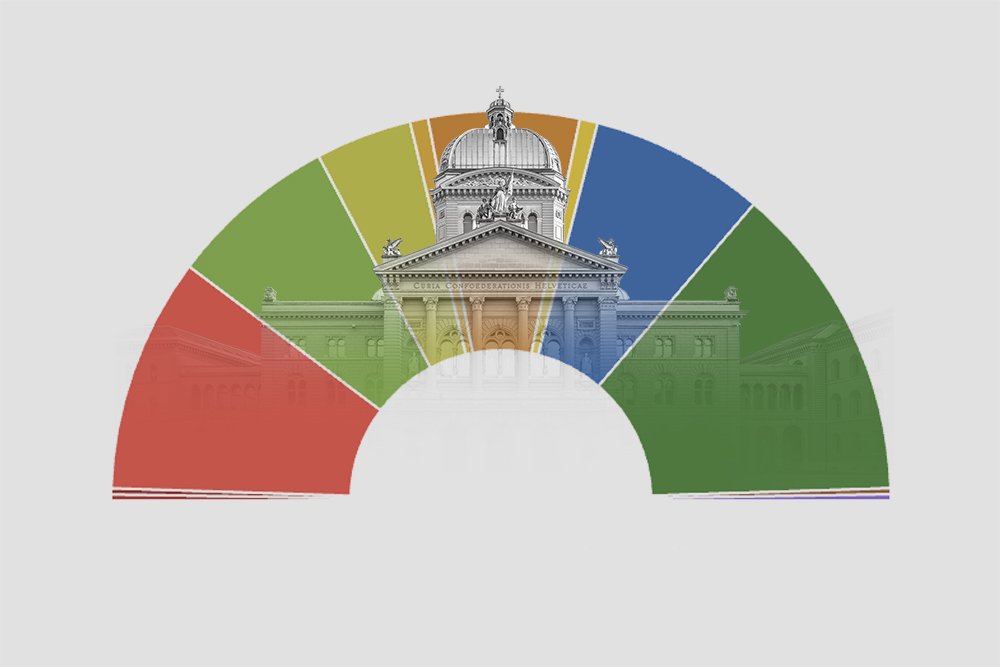Swiss parliament: who is entitled to be represented?

The new House of Representatives is older and more male than the previous one. Should all population groups be proportionately represented in politics?
The average Swiss parliament member is male, well-educated and 50 years old. This year’s elections have accentuated an already existing trend.
“The 2023 elections have resulted in less diversity,” says Daniel Höhmann, a political scientist at the University of Basel. “This is a step backwards in terms of the representation of the different segments of the Swiss population.”
Some 38.5% of the members of the House of Representatives are women, although just over half the population of Switzerland is female; 1.5% of the members – three people – have disabilities, although over 10% of the population has some form of disability. These are two striking examples of the differences between the Swiss population and their elected representatives.
Should a parliament reflect the diversity of the population? Absolutely, says Höhmann, and for several reasons.
From a symbolic point of view, he explains, diversity shows that the political sphere is open to a wide range of interests within the population. “This is a cornerstone of democracy.” Everyone should be able to participate in political life and represent their interests.
An important aspect of this is the role model function: seeing parliamentarians from similar life situations spurs others to get involved themselves.
People who feel represented also have greater trust in politics. “If members of parliament have similar experiences, problems and life situations to you, then you are more confident that they will also stand up for your preferences and problems.”
Höhmann says research shows that members of previously marginalised groups are increasingly involved in promoting the interests of these groups. Issues are put on the agenda that might otherwise have been forgotten.
Fewer female parliamentarians
There are now 77 women in the 200-member House of Representatives. Compared to the 2019 election, the proportion of women has thus fallen from 42% to 38.5%. This puts Switzerland behind Moldova but ahead of France.
No European national parliament has a proportion of 50% women. Iceland tops the list in Europe with 47.6%, while Rwanda leads worldwide with 61.3% women in the first chamber of parliament.
In the 2019 elections, more women were elected in Switzerland than ever before. The 2023 elections now represent a downturn. The cross-party movement “Helvetia Calls!”, which calls on women to run for office, is nonetheless optimistic. History shows that progress is not always linear. “Of course we hoped for more, but we’re not surprised by the result,” says Flavia Kleiner, co-initiator of the campaign. This is because the right-wing Swiss People’s Party, where women are the least represented, did best in the elections, as expected, and the Greens and Liberal Greens – which both have a high proportion of women – suffered a loss.

More
Elections 2023: Switzerland loses ground on women in parliament
Advocate for the queer community
The unexpected election of Zurich LGBTQ+ activist Anna Rosenwasser received considerable media attention. She ran in an unpromising position on the Social Democratic Party list and focused primarily on LGBTQ+ issues in her campaign, which was based on social media. She is now the third openly queer woman in the history of the Swiss parliament to sit in the House of Representatives.
No figures are available on the representation of the queer community in parliament. The openly queer members of parliament are lesbian, bisexual or gay; trans people or non-binary people, among others, are not represented in the national parliament.
Among those re-elected were the gay Radical-Liberal parliamentarian Hans-Peter Portmann and the bisexual Social Democrat parliamentarian Tamara Funiciello. The first openly gay speaker of the House of Representatives was the Social Democrat politician Claude Janiak, who took office in 2005.
Older than the population
Most members of the new parliament are between 35 and 64 years old. Young people and pensioners are clearly underrepresented. Katja Riem of the People’s Party was born in 1996 and is thus the youngest member. The party also boasts the oldest parliamentarian, Charles Poncet, born in 1947.
If we go back a bit, the People’s Party also holds the title for the youngest parliamentarian in history. In 1995, Toni Brunner, who later became the president of the People’s Party, was elected to the House of Representatives at the age of 21. Back then, the Swiss population was younger than it is today, but the House of Representatives was slightly older, with an average age of 51.
In 2019 the average age in the House of Representatives was 49. This made it the youngest ever since the introduction of voting rights for women in 1971. With the 2023 election, the average age of members of the House of Representatives has again risen and now stands at 49.5 years.
Disabled interests more broadly supported
Three men with disabilities are part of the new House of Representatives. They are the re-elected members Christian Lohr and Philipp Kutter, both of the Centre Party, and the newly elected Social Democrat Islam Alijaj, who placed strong emphasis on the representation of people with disabilities in his election campaign.
Three out of 200? That seems a low number. But Philipp Schüepp of Pro Infirmis, the umbrella organisation for people with disabilities, says: “It means that the issues and concerns of people with disabilities are more broadly supported in parliament.”
Being represented in parliament is important because disabilities concern all policy areas. “Politicians with disabilities are the best experts on the issues that affect them. And that is all issues. People with disabilities want to participate equally in all spheres of life and are concerned by all political decisions,” says Schüepp. This is also true of the representatives of all minorities.
Immigrant background a disadvantage on party lists
In 2021 a good 39% of people in Switzerland aged 15 and over, with or without a Swiss passport, had an immigrant background. There are no exact figures on how well they are represented in parliament. However, an analysis conducted before the elections by newspaper Blick found that of the 5,909 candidates to the House of Representatives, some 810 had foreign surnames – that is, fewer than one in six candidates.
Of course, it cannot immediately be concluded that someone has an immigrant background because of their name. But political scientist Lea Portmann says: “It is an important indicator of how a person is perceived: as typically Swiss or with a migration background.”
Portmann was involved in a 2015 study by the University of Lucerne on elections to the House of Representatives. It found that candidates with foreign-sounding names were more likely to be crossed off the lists. She has not seen any evidence to refute this to this day.
Well before the elections, parties from left to right recognised the potential of the Kosovar diaspora and tried to woo it. With Islam Alijaj, the Kosovar Swiss are now represented in the House of Representatives for the first time.

More
How Swiss parties court the Kosovar diaspora
A parliament of the highly educated
The Swiss parliament is a club of the highly educated: the new House of Representatives comprises around twice as many people with a higher education than the general population. Of those elected, only a few have given compulsory schooling as their highest level of education.
Professionally, farmers are traditionally overrepresented in Swiss politics, alongside lawyers. They account for one in ten members of parliament, whereas just 2% of the total population works in agriculture.
Today, public focus is on the representation of women and people with an immigrant background. In the coming years, the question of appropriate representation of the different social classes could also come to the fore, says Höhmann. “Craftspeople and the working class in particular; more research is needed into how well they are represented.”
Who is entitled to be represented in parliament?
Although people with disabilities, people with an immigration background, women or young, retired and queer people have gained a foothold in parliament, they are underrepresented compared with the Swiss population. In discussions on diversity, however, critical voices soon ring out. Who is entitled to be represented in parliament? Should left-handed people and vegans also be represented?
“In research, we consider that those groups need representation that would be seriously disadvantaged if they were not adequately represented and would be unable to make their essential interests heard,” says Höhmann of the University of Basel.
So there are reasons grounded in political science why certain groups – unlike left-handed people – should be adequately represented in parliament.
Edited by Benjamin von Wyl. Translated from German by Julia Bassam.

In compliance with the JTI standards
More: SWI swissinfo.ch certified by the Journalism Trust Initiative












You can find an overview of ongoing debates with our journalists here . Please join us!
If you want to start a conversation about a topic raised in this article or want to report factual errors, email us at english@swissinfo.ch.